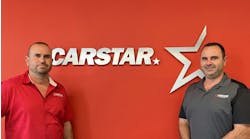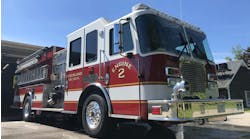A Vermont body shop has emerged victorious in a lawsuit against Nationwide Insurance over short pays on collision claims. Rutland, Vt.-based Parker's Classic Auto Works successfully fought off an appeal in a small claims court case involving nearly $12,000 in reimbursements. Parker's utilized assignment of proceeds documents to bring the suit against the insurer after having the vehicle owners sign over the claims to the shop.
According to owner Mike Parker, short pays had been a problem for a long time, but the shop had typically written them off. When he heard about the assignment of proceeds approach that other shops had taken at a Coalition of Collision Repair Excellence (CCRE) meeting, he began having customers sign the documents in order to collect short pays on their vehicles.
According to Parker, at the time he first talked to his attorney about the cases, he had documented $80,000 in short pays. "By the time we went to court, that had more than doubled," Parker says. "That was the total of all the insurance companies together."
As an example of how expensive some of these short pays could be, Parker said that one job was shorted by $1,800; another, involving a $36,000 repair on a Mercedes-Benz, was shorted by $3,300. Parker didn’t think it was fair to ask his customers to make up the difference when the insurers were denying claims on what he says were necessary steps in the repair process.
"We felt that if we went back to the customer and said, well you've got to pay us $3,300 because your insurance company shorted us – I understand he could go after them for the money himself, but Rutland is about 18,000 and we've got another 7,000 or 8,000 in the surrounding area, and word travels fast," Parker says. "Once I heard about the assignment of proceeds document, I thought we'd give it a whirl."
Parker asked his attorney to help draw up the documents. When Parker had amassed a significant number of short pays with an attached assignment, he talked to the attorney about filing suit, and they decided to bring the initial claim against Nationwide.
In February 2010, Parker filed three small claims court complaints (with a total of 31 claims between them) against Nationwide alleging that the insurer breached its policies by failing to pay the total cost of auto repairs on the vehicles. The 31 claims totaled more than $11,000.
Parker won at a jury trial in the summer of 2010. Nationwide's initial appeal was denied. The insurance company then appealed to the state Supreme Court and offered to settle with Parker for the original amount owed, minus interest. "I told them no," Parker says. "Then they withdrew the appeal and wrote us a check."
Appeal denied
Nationwide appealed the original decision by arguing that the small claims court had improperly allowed evidence other than the original individual policies to be presented; that the court improperly admitted the assignment of proceeds documents; that the evidence did not support the jury verdict because the signed documents purported to assign "proceeds" rather than claims; and that Parker improperly split the claims to satisfy the jurisdictional limit for small claims court.
The court found that all documents were properly submitted. When refuting Nationwide's argument regarding the use of the word "proceeds," which the insurance company claimed did not connote the ability to bring suit upon the claim, the court wrote that "Parker's and the 31 insureds intended that the assignments gave Parker's the insured's right to assert their legal claims against Nationwide, and not just the right to any money otherwise collected on those claims."
Nationwide also argued that Parker had improperly split the claim to meet small claims court requirements. The court, however, found that while a plaintiff may not subdivide a single, indivisible claim into multiple suits, Parker had acted properly because he had simply grouped multiple separate claims. "This decision advanced judicial economy and did not run afoul of the claim-splitting prohibition," the court wrote.
Assignment of proceeds cases are becoming more common in the collision industry as shops look for ways to recoup short pays. In June 2010, a New York judge ruled in favor of Nick Orso's Body Shop in an assignment of proceeds case involving Adirondack Insurance Exchange. In 2009, Alpine Body Shop in Ogden, Utah, had a similar victory over GEICO that was overturned on appeal.
An assignment of proceeds form generally entitles the repairer to receive payment from the insurer, but does not limit payments to whatever the insurer elects to reimburse. It also doesn't act as a separate contract between the repairer and insurer. And these agreements are generally not a guaranteed fix for every dispute; most experts in the industry have warned against relying too heavily on them. Instead, they should be used when insurers are consistently underpaying by significant amounts.
Every state has different laws covering assignment of proceeds, so it’s important to check with a local attorney as well as the state department of insurance or other shops that have pursued this before moving forward.
In Parker's case, he said that every client receives a form and a clear explanation of what they are signing. "We explain to the customer that there are going to be things that the insurance company will tell them that they don't reimburse, but that are necessary to repair the car," Parker says. "I tell them that they can sign this document that will allow us to stand in their shoes and collect the money the insurance company owes them. And everybody always responds, 'Where do I sign?' Everything is explained to them up front."
Parker plans to bring similar suits against other insurance companies with significant short pay issues, and he and his attorney have tweaked the language in the assignment of proceeds agreement in response to issues that arose in the Nationwide case.




